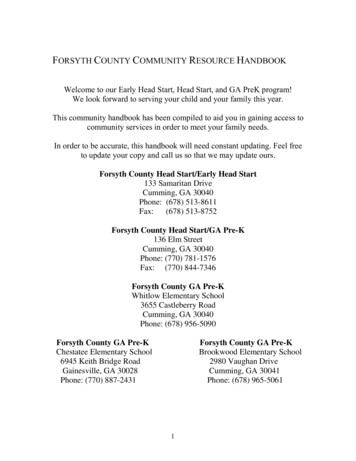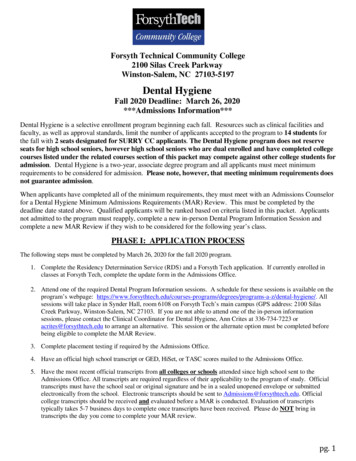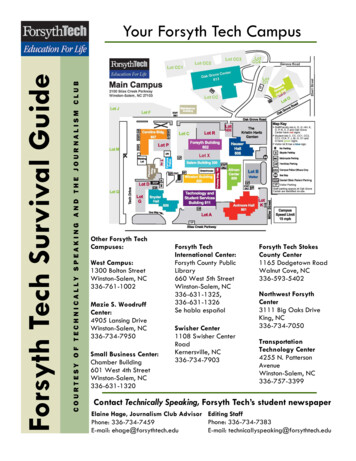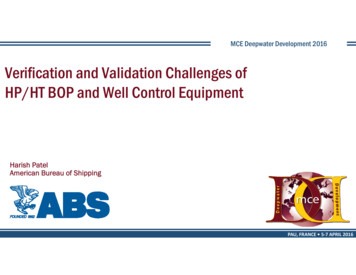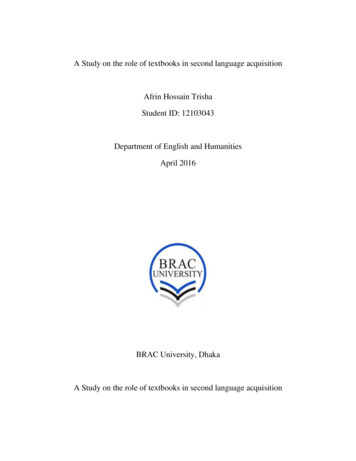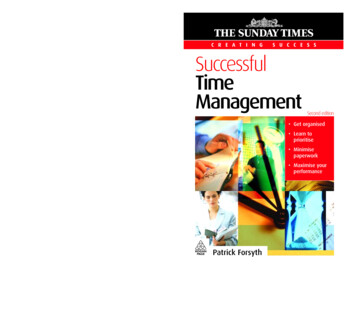
Transcription
Success Time Mang UK aw30/5/072:59 pmPage 1C R E A T I N GProfessional MarketingIn today’s workplace, the increasing pressure to achieve makes timemanagement a vital skill. You need to be able to work efficiently andeffectively to ensure that you get the results you want.This fully revised new edition of Successful Time Management sets outpractical guidelines to help you do just that. With new advice on using e-maileffectively, it helps everyone to review their own time management and adoptnew working practices to improve it. There are time-saving ideas, practicalsolutions and checklists, plus great advice on: controlling paperwork;getting and staying organised;delegating and working with others;focusing on key issues.Whether you are under pressure or not, this essential guide will help you toreduce time-wasting and interruptions, and focus on the priority tasks thatlead to success in your job and career – it could just change your life!Kogan Page120 Pentonville RoadLondon N1 9JNUnited gan Page US525 South 4th Street, #241Philadelphia PA 19147USAISBN-10: 0-7494-4834-2ISBN-13: 978-07494-4834-9Business and managementSecond edition Get organised Learn toprioritise Minimisepaperwork Maximise yourperformancePatrick Forsyth 8.99US 17.50SuccessfulTimeManagementSecond editionPatrick Forsyth runs Touchstone Training and Consultancy, which advises onmarketing, sales and communication skills. An established author, he haswritten a number of successful books including How to Motivate People andHow to Write Reports and Proposals (both published by Kogan Page in theCreating Success Series).SUCCESSFUL TIME MANAGEMENT“Patrick has a lucid and elegant style of writing which allows him to presentinformation in a way that is organised, focused and easy to apply.”S U C C E S SPatrick Forsyth
C R E A T I N GS U C C E S SSuccessfulTime ManagementThird editionPatrick ForsythLondon and Philadelphia
Publisher’s noteEvery possible effort has been made to ensure that the information contained in thisbook is accurate at the time of going to press, and the publishers and authors cannotaccept responsibility for any errors or omissions, however caused. No responsibilityfor loss or damage occasioned to any person acting, or refraining from action, as aresult of the material in this publication can be accepted by the editor, the publisher orthe author.First published in Great Britain and the United States in 2003 by Kogan Page LimitedSecond edition published in 2007Apart from any fair dealing for the purposes of research or private study, or criticism orreview, as permitted under the Copyright, Designs and Patents Act 1988, this publication may only be reproduced, stored or transmitted, in any form or by any means, withthe prior permission in writing of the publishers, or in the case of reprographic reproduction in accordance with the terms and licences issued by the CLA. Enquiriesconcerning reproduction outside these terms should be sent to the publishers at theundermentioned addresses:120 Pentonville RoadLondon N1 9JNUnited Kingdomwww.kogan-page.co.uk525 South 4th Street, #241Philadelphia PA 19147USA Patrick Forsyth, 2007The right of Patrick Forsyth to be identified as the author of this work has beenasserted by him in accordance with the Copyright, Designs and Patents Act 1988.ISBN-10 0 7494 4834 2ISBN-13 978 0 7494 4834 9The views expressed in this book are those of the author and are not necessarily thesame as those of Times Newspapers Ltd.British Library Cataloguing-in-Publication DataA CIP record for this book is available from the British Library.Library of Congress Cataloging-in-Publication DataForsyth, Patrick.Successful time management / Patrick Forsyth.--2nd ed.p. cm.ISBN-13: 978-0-7494-4834-9ISBN-10: 0-7494-4834-21. Time management. I. Title.HD69.T54F67 2007650.1’l--dc222006030169Typeset by Jean Cussons Typesetting, Diss, NorfolkPrinted and bound in India by Replika Press Pvt Ltd
ContentsPrefacev1. Time: a key resource – opportunities and difficultiesMaking it work 3; A personal approach 4; Theproductivity gain 5; Speculate to accumulate 7;Perfect time 812. First steps towards effective time managementYour work mix 12; Assessing your currentworking practice 14; Plan the work and work theplan 17; What kind of system? 19; Setting clearobjectives 21; Thinking ahead 23; Spend time tosave time 25; Taking time to think 26; Be preparedto say ‘no’ 27; To be, or not to be (perfect) 28;Work smarter not longer 30; Reward yourself 31113. Getting (and staying) organisedWork the plan 36; Batch your tasks 37; Use yourdiary effectively 38; Schedule appointments withcare 40; Clear your desk 41; Avoid ‘cherrypicking’ 42; Use abstracts 43; The internet 44;Highlight key facts 45; Insist on quality 45;Action or investment 47; A good personal assistant34
iv Contents(or secretary) 48; Use a ‘document parking’system 51; Make use of checklists 52; Directingthe techniques at particular result areas 53;Intermission take a break 554. Combating the time wastersThe greatest time waster? 58; Handling personalinterruptions 62; Handling telephoneinterruptions 66; Save time getting through 68;Make messages accurate 69; E-mail 70; On themove 71; Thinking about e-mail 75575. First things firstPareto’s law 83; Make the miscellaneous apriority 85; Schedule – backwards 86; Be honestabout deadlines 87; Review task methodology 89;Eliminate the unnecessary 90; Danger – keep yourdistance 92; Be confident of your priorities 93826. Controlling the paperworkAim to minimise paperwork 96; Make a habit ofbrevity 97; Minimal memos 99; Minimise yourpaper handling 100; Do not let files and filing wastetime 101; Keep papers neat 104; Computerise it –but carefully 105; Do not duplicate informationunnecessarily 107; Do not proliferate informationunnecessarily 107; Do not put it in writing 109;Write faster 110; WPB – the most time-savingobject in your office 110957. Working with other peopleThe socialising organisation 113; Informalcontact 114; Making a working lunch work 116;Consider a day out 117; No conflict – no wastedtime 118; The right people 120; The need for clearinstructions 121; Don’t do it – delegate 122; Swap112
Contents vtasks to save time 128; Develop your people 129;Simply the most time-saving phrase in thelanguage 131; Do not hover 133; Motivate yourpeople 134; Provide specific time management helpfor staff 135; Make and keep some firm rules 136;Meetings – danger or opportunity 1388. Final wordsAppendix: Time management format examples144146
Preface‘The day is of infinite length for himwho knows how to appreciate and use it’GoetheIf you are busy then you are normal. The modern workplace isunrelenting and deadlines, pressure (and, if you let it get toyou, stress too) and a daily avalanche of e-mails are the orderof the day. Dealing with this must be part of everyone’s stock intrade. The fact that this book is being produced in a secondedition is a sign of the perennial nature of its subject.You are doubtless judged by what you do, by the results youachieve. To survive and prosper you have to be productive, efficient and effective. Time management is about workingactively to create efficiency and effectiveness in a way thatmakes achieving your targeted results more likely. Success doesnot just happen. You make it happen. So too with your workpattern, you create it and do so for good or ill. Here weexamine an essential foundation to success.Good, effective time management is a core skill, a career skillthat we all need both to make us able to perform in a currentjob and to enhance our career prospects. It is a real differentiating factor, one where getting to grips with it can see youconsistently achieving what you want in both job and career ina way that gives you an edge on other people, perhaps of equalability, but who lack this aspect of self-organisation and disci-
Preface viipline. Addressing this area is not in any sense an option. It isnot that being an effective time manager would be somehow‘nice’ or maybe ‘useful’; it is essential to making your work andcareer successful.Making a differenceThe overall principles of time management are straightforward.It has been said that you should: do what’s important, andignore what isn’t and that urgent things are only importantthings that were not addressed when they originated. Trueenough, but oversimplifying does not make tackling the detailsany easier. The process needs application and commitment ifsome of the elements of good time management are to be putinto practice. As things become engrained as habit it becomeseasier. But becoming, and remaining, well organised is possible.It is not rocket science; indeed what needs to be done is largelycommon sense. But it is a matter of getting the details right –there is no magic formula, and there are many factors toconsider. This book reviews the key approaches, and sets outthe techniques and a whole raft of tips to make you moreproductive. It is designed to be practical, and to make implementation manageable.Reviewing the process is the first step to improving what youdo with your time. You can make a difference, and you will likethe difference you make. If you work smarter (rather than justlonger and harder), then you will achieve more and find yourjob less stressful and more satisfying.Of course, you must read the book and that takes a while(though by definition a good book about time management issurely a short one, as this is). Consider it an investment – takea little time now and you can save a significant amount of timeevery day thereafter. If you can certainly use some extra time,then that again shows that you are normal.
Successful Time Management 1-152:Successful Time Management6/10/0616:031Time: a key resource– opportunities anddifficultiesSuccess is a process, a quality of mind and wayof being, an outgoing affirmation of life.Alex NobleWhatever job you do, if you are in a management or executiverole, you will utilise a number of resources. People, money,materials – all are important. In any particular job, oneresource may predominate. But there is one resource we allhave in common: time. And time is a hard taskmaster.Everyone occasionally experiences problems getting everythingdone, and doing it all in the time available. For some, suchproblems seem perpetually to exist to one degree or another;others will admit to having moments when things seem toconspire to prevent work going as planned, and a few to livingin a state of permanent chaos.Who then needs to think about time management? Everyone,potentially, can benefit from reviewing how to manage theirtime effectively. In any organisation many of the things thatactually characterise its very nature make proper time management difficult: hierarchical structures, people, deadlines,Page 1
Successful Time Management 1-152:Successful Time Management6/10/0616:032 Successful time managementpaperwork, e-mail, computer problems, meetings, pressuresand interactions, both around the organisation and externally;all these and more can compound the problems.This book aims to help solve the problems of time management for all those working in executive or managerial positionswithin organisations, whether commercial or otherwise, andwho are charged with getting things done and achieving results.If you are in this category, even if you have already made strenuous attempts to organise the way you work, then you maypick up ideas that will help you achieve more. If you see yourself as having too much to do, if you have too little time inwhich to do it, if coping with the urgent means you never get toall the important things on your list, and you would like to bemore organised and do not quite know how to go aboutbecoming so, then this book is directed at you. If your desk ispiled with untidy heaps of paper, you are constantly subject tointerruptions, your deadlines are impossible and you despair ofever being able to get your head above water, then this book isdefinitely for you.Time management is not optional. It is something thateveryone who wants to work effectively must consider, whetherformally or informally. In fact, virtually everyone practises timemanagement to some degree; the only question is how well theydo it and how it affects what they do. Yet, time management isnot easy – as you may have noticed! Nor, even for those whowork at it, is it something that anyone gets 100 per cent right.If you think that is a rather ominous start to a book on timemanagement, there is worse to come. The classic author G KChesterton wrote: ‘The Christian ideal has not been tried andfound wanting. It has been found difficult; and left untried.’ Sotoo with time management: just because it is difficult, the temptation can be to despair of ever making a real difference, and togive up on it, letting things take their course and muddlingthrough somehow. To varying degrees, this temptation is oftenvery strong.Page 2
Successful Time Management 1-152:Successful Time Management6/10/0616:03Time: a key resource – opportunities and difficulties 3Making it workBut, and it is a positive but, you can make a difference and sucha difference cannot only be worthwhile, it can have a radicaleffect on both job and career. Make no mistake: the effect ofgetting to grips with time management can be considerable andvaried. It can: Affect your efficiency, effectiveness and productivity. Thisalone makes your attitude to time management very important, for it affects your work day by day, hour by hour, allthe time. Condition the pressure that goes with any job. Create greater positive visibility. Time management issomething that will influence how you are perceived byothers within the organisation. Good time management isan overriding factor that can differentiate people of otherwise equal talent and ability, making it more likely thatsome will succeed better in career terms than others.Thus, although it may take some time, getting to grips withyour own personal system of time management is immenselyimportant. Time management must be seen as synonymouswith self-management; it demands discipline, but disciplinereinforced by habit. In other words, the good news is that itgets easier as you work at it. Good habits help ensure a wellorganised approach to the way you plan and execute yourwork. On the other hand, bad habits – as many of us are aware– are difficult to shift. And the changing of habits is somethingthat may well be a necessary result of any review of how youwork.Making time management work for you is based on two keyfactors: how you plan your time and how you implement thedetail of what you do. The first of these, which is reviewed inthe early part of this book, creates an important foundationPage 3
Successful Time Management 1-152:Successful Time Management6/10/0616:034 Successful time managementupon which you can then build and work. The second consistsof a multitude of operational factors, practices, methods andtricks, all of which can individually and positively affect theway in which you work. Such factors may be absurdly simple,for example, visibly checking your watch from time to time willtend to make visitors less likely to overstay their welcome,especially if such checks are accompanied by the appropriatelook of concern. Or they may demand more complexity, forexample, a well-set-up filing system can save time, ensuringthat you can locate papers quickly and accurately.Other factors may be downright sneaky, like having a privatesignal to prompt your secretary to interrupt a meeting withnews of something demanding its rapid curtailment or yourprompt departure. Furthermore, there is a cumulative effect atwork here. This means that the more you adopt or adapt thetricks of the trade that work for you, the more time-efficientyou become. This is a process that most of us can continue toadd to and work on throughout our career. So, unless you are aparagon of time-efficient virtue, a review of whether you areworking in the best possible way is nearly always worthwhile.Indeed, it can pay dividends to keep a regular eye on thisthroughout your working life. This too can become a habit.A personal approachBecause of the way time management works, influenced as it isby many things, what works in any particular kind of job or forany particular individual will vary. Some of the ideas you willfind presented here, or elsewhere, you will be able to add profitably to your own working habits. Some will be new to you;some you will know but may not be utilising as effectively asyou might. Others will be able to form only the basis of whatwill suit you. They will need personalising, tailoring to thecircumstances in which you work, and it is always important toPage 4
Successful Time Management 1-152:Successful Time Management6/10/0616:03Time: a key resource – opportunities and difficulties 5consider this option with any idea you review before rejectingit.Be careful not to reject out of hand anything that might beuseful in amended form. This is an area where every smallinfluence can assist your overall productivity. Of course, someideas will not suit you at all. However much you tinker withthem, they will not form a useful basis for the kind of way inwhich you work. So be it. The aim should be to review thoroughly and then use every possible way to enhance the productivity of your job. What matters is arriving at a point whereyou are content that, having explored the possibilities foraction, you have selected, adapted and experimented with allthe methods that can realistically fit in with the way youwork and assist your productivity. It is you who matters ultimately, not the principles. However, do remember thatanything – but anything – that can help should be consideredand, unless it has a negative impact, made part of your workingpractice. Good time management comes from leaving no stoneunturned.The productivity gainTime may be relative, but it is a resource as valuable as anyother. Yet, it is so easy to squander. Why is it that the thoughtand effort given to the appropriate use of other resources,money for instance, is so much greater than for time? The sheerdifficulty of some aspects of time management and the powerof habit explain some of this, but there is, I think, anotherreason.Long ago Peter Cook appeared in a sketch about the possibility of a nuclear war, when it was said that the early warningradar would give four minutes’ warning of any enemy missilesaimed our way. ‘What can you do in four minutes?’, asked onecharacter incredulously. ‘Some people’, came the reply, ‘can runa mile in four minutes!’ Though sadly inadequate for the taskPage 5
Successful Time Management 1-152:Successful Time Management6/10/0616:036 Successful time managementof escaping from annihilation, four minutes is still, well, fourminutes, and it is an important principle of time managementthat even small periods of time can readily add up to a worthwhile amount.Consider four minutes saved – by not running that mileperhaps. It is easy to think of it as not worthwhile. However, ifthe four minutes is saved by increasing efficiency on one smalltask undertaken regularly then, for something done every day,that adds up to more than 14 hours over a year! That is verynearly as much as two working days, and should give anyonepause for thought. What could you do – extra – with two additional working days? It is undeniably a useful amount of timeand most people have probably got a dozen jobs on their listthat could be got out of the way if an additional two days werereally available. This thought comes from imagining whatspeeding up just one small regular task or perhaps avoidingwasting time, to the tune of just four minutes, can do foryou. So, another significant reason why time managementmay be neglected is that individual small savings of time mayseem unimportant. We tend to wonder what five minutes hereor there matters, when what is really needed is a clear hour orday without interruptions. Yet, clearly, such short momentsadd up.If this fact is recognised, and time and activities plannedaccordingly, then it is possible to free up considerable amountsof time. What is more, this can often be done at minimal cost.This is worth noting, as many potential improvements to efficiency do have a cost. If you want new equipment, more inyour budget, or additional people, then in many organisationsthis needs considerable justification and may still be turneddown. But your time is yours to utilise. It is an area where youcan make a real difference to performance armed with littlemore than the intention to do so.Page 6
Successful Time Management 1-152:Successful Time Management6/10/0616:03Time: a key resource – opportunities and difficulties 7Speculate to accumulateA further point needs stating before we turn to areas of individual action. You will find that some ways of saving time, orutilising it better, do need an investment – but it is an investment of time. It may seem like a contradiction in terms, havingto spend time to save time. Again, this can all too easily becomea barrier to action. Yet the principle is clear: there is a timeequation that can and must be put to work if time is to bebrought under control. There are many ways of ensuring thattime is utilised to best effect, and, while some take only amoment, others take time either to set up or for you to adoptthe habit of working in a particular way.Consider an example, one linked to delegation, a subject wereturn to later and to the commonly heard phrase, ‘It’s quickerto do it myself.’ When this thought comes to mind, sometimes,and certainly in the short term, the sentiment may well becorrect. It is quicker to do it yourself. But beware, because thismay only be true at the moment something occurs. Saysomeone telephones you requesting certain information,imagine also that you must locate and look something up,compose a brief explanatory note and send the information offto the other person. It is a minor matter and will take you threeor four minutes. Imagine further that, to avoid the task, youconsider letting your secretary do it. Explaining and showinghim or her what needs to be done will certainly take 10–15minutes of your time and your secretary’s. It really is quicker todo it yourself. Not so, certainly not if it is a regularly occurringtask. If it happens 10 times a week, say, then if you take time tobrief your secretary he or she will only have to take it on forless than a week and the time spent briefing will have paid off.Thereafter you save a significant amount of time every week,indeed on every occasion that similar requests are made in thefuture. This is surely worthwhile. The time equation here oftime spent as a ratio of time saved works positively. This isPage 7
Successful Time Management 1-152:Successful Time Management6/10/0616:038 Successful time managementoften the case, and allows worthwhile savings to be made, bothto simple examples and to more complex matters where hoursor days spent on, say, reorganising a system or process may stillpay dividends.So, why is it so difficult to take this sort of action? Why is theworld full of people saying that it is quicker to do some thingsthemselves? Some of the reasons may be to do with attitudes todelegation (of which more later); beyond that it is largely habitand lack of thought – and perhaps the pressure of the moment.We judge that it is possible to pause for the few moments necessary to get another task out of the way, but somehow not forlong enough to carry out a briefing that would rid us of thetask altogether, and ultimately make a real time saving. It isworth a thought. Become determined not to be caught in thistime trap and you are en route to saving a great deal of time.Given the right intention, and motivation, it is possible foranyone to improve their time utilisation, and to do so markedlyif you have not thought about it recently. Make no mistake,however, the process does not stop there. It takes more than areview of time management and the adoption of one or twoideas to make you truly productive for life. A review can kickstart the process, but the right way of thinking must continueit. The best time managers have not only instilled in themselvesgood habits and so put part of the process on auto pilot, so tospeak, they also view time management as an area of perpetualfine-tuning. In everything they do the time dimension is considered. It becomes a prerequisite for the various ways in whichthey work. And they continuously strive to improve still further– changing the way they work and what it allows them toachieve. That fine-tuning too becomes a habit.Perfect timeOne final introductory point. Time management is very muchPage 8
Successful Time Management 1-152:Successful Time Management6/10/0616:03Time: a key resource – opportunities and difficulties 9an area where the old saying ‘Never let perfection be the enemyof the good’ is entirely appropriate. However well youapproach the management of your time, you are never going tobe able to regard it as perfect. Nothing will guarantee that youwill never be unable to find anything again, nor will it meannothing takes longer in future than you think it will, nor thatyou are never interrupted again, not least at a crucial moment.Remember Murphy’s Law: that if something can go wrong orturn out inconveniently it will. Nor does it mean that you willnever again find yourself saying: ‘If only I had more time ’.Indeed, in many jobs there is a creative element. You areemployed to make things happen, to innovate, review andchange things and to do so in a dynamic environment where itsometimes seems that nothing stays the same for five wholeminutes. It is inherent in such circumstances that there willalways be new things to do and that, as a consequence, you willnever get to the bottom of the ‘Things to do’ list. The time toworry is not when you have too much to do, but more whenyou do not have enough to do.But though perfection may not be possible, improvementcertainly is. Every saving of time, every productivity gain,whether large or small, adds to the total way in which yourstyle of working contributes to your effectiveness. Any aspectof a job can probably be changed for the better, in terms of howit is done, to use time more productively. This means that youmust actively organise what you do and how you do it toproduce optimum working and to be really effective. It is thisprocess that using the principles of time management andadopting the right attitude can assist. Doing this and doing itthoroughly will benefit you and your organisation; and some ofthose benefits can come quickly.Note: Corporate culture is becoming increasingly aggressivein its focus on productivity in the sense of hours worked. Moreand more people are spending more and more hours on the job,willingly or not. Yet there is plenty of evidence which statesthat extra hours do not translate directly into increasedPage 9
Successful Time Management 1-152:Successful Time Management6/10/0616:0310 Successful time managementproductivity, not least because stress and tiredness dilute effectiveness.It is difficult for an individual to challenge this culture, but itshould not be followed slavishly. The ideas of effective timemanagement operate within some definition of the ‘workingday’, and that will vary for every individual. Just simply addinghours unthinkingly can only achieve so much. The intentionhere is to show that changing habits and enhancing effectiveness by adopting the right way of working pay dividends. Ifyou do this and achieve your objectives, then maybe the pressure to just ‘put in more time’ will decrease. If you aremanaging other people and creating the culture then this aspectmay be worth a moment’s thought (and you could do worsethan to read my book How to Motivate People, also publishedby Kogan Page).Page 10
Successful Time Management 1-152:Successful Time Management6/10/0616:032First steps towardseffective timemanagementTomorrow is always the busiest day of the week.Jonathon LazearThere are many activities where the whole is greater than thesum of the individual parts. For instance, juggling with flamingtorches necessitates more than specific movements of thehands. Avoiding burning holes in the carpet depends also onoverall coordination, concentration and getting the individualmovements exactly right. Time management is similar. Theindividual techniques, ideas and tricks of the trade will allowyou to make some progress towards an effective and efficientway of working, but only approaching the process on a broadfront will lead to sustained practice that will ensure continuingeffectiveness. Unless the right attitude is adopted, then timemanagement will never be more than an initial enthusiasticembracing of techniques, which are then allowed rapidly toatrophy.Thus, time management involves not just keeping yourpaperwork tidy and your desk clear, but a whole way ofworking that underlies all your actions and interfaces with allPage 11
Successful Time Management 1-152:Successful Time Management6/10/0616:0312 Successful time managementfacets of your job. Because of this we review next a number ofall-embracing rather than individual factors that need to beapplied with an eye on the whole of the rest of your job and therange of tasks it entails. They start, logically enough, with theneed to assess how you work now as a basis for consideringaction and possibly changes in the future.Your work mixWhatever your individual job, whether you are manager orexecutive, and regardless of the type of organisation for whichyou work and the functional area in which you are involved,you doubtless have many different things to do; too manyperhaps. These are different in nature and complexity, andinvolve different timescales. They range
In today’s workplace, the increasing pressure to achieve makes time management a vital skill. You need to be able to work efficiently and effectively to ensure that you get the results you want. This fully revised new edition of Successful Time Management sets out practical guidelines
